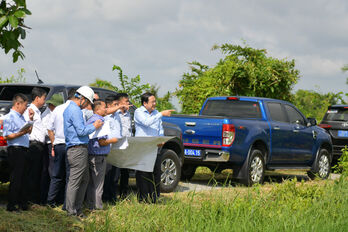
Workers pump gas into shells at the Northern Central Gas Store in Vung Ang Industrial zone, Ha Tinh province (Photo: VNA)
Nguyen Quyet Thang, head of market division at the PetroVietnam Gas Corporation, told a conference on November 14 that domestic gas supply is on decline but demand keeps increasing.
A MoIT report on the mining industry performance in the first half of 2018 showed natural gas output was estimated at 5.3 billion cubic metres, a yearly increase of 1 percent, and liquefied gas production was estimated at 437,600 tonnes, up 18.5 percent year on year.
Meanwhile, gas consumption in 2016-20 is estimated at 11-15 billion cubic metres each year and 13-27 cubic metres for 2021-25. Annual gas import is planned at 1-3 billion cubic metres for 2021-25 and 6-10 billion cubic metres for 2026-35.
By 2020, the percentage of gas used in power production accounts for 16 percent of the country’s total gas production and it will reach 19 percent by 2025.
Therefore, Vietnam is expected to encounter a shortage of gas supply from 2020, Thang said, adding the country needs to purchase liquefied gas from overseas exporters.
There are now 19 liquefied gas exporters, led by Qatar and Australia. The world’s total liquefied gas production is at 266 million tonnes per year and will reach 360 million during 2020-30.
The International Energy Agency (IEA) on November 13 reported natural gas will replace coal to be the second largest energy source in the world in 2030 due to countries’ commitment to lessen environment pollution.
Global gas demand will rise 1.6 percent annually until 2040 and it will be 45 percent higher than the current demand.
According to Thang, Vietnam needs to invest in its storing infrastructure first. The country is building two gas storehouses Thi Vai in Ba Ria – Vung Tau province and Son My in Binh Thuan province, which are scheduled to complete in 2020 and 2023, respectively.
Ngo Thuy Quynh, MoIT’s head of oil, gas and coal department, told the conference the gas industry has been well developing to meet the market demand and requirements.
Clean energies such as renewable energy and gas-based power are the new trend of the world and Vietnam is a part of that trend in the context that thermal power production is facing limitations and challenges regarding environmental policies and financial requirements, she said.
However, there are obstacles for gas-based power production especially the policy framework, Quynh said, adding the industry is young and unattractive to investors for its high initial investment cost.
A harsher legal framework, such as a penal code item, is needed to handle frauds in the domestic gas market so that the sector can re-gain consumers’ trust, settle social security and get healthier, according to Tran Trong Huu, vice chairman of the Vietnam Gas Association.
The most critical issue now is the illegal storage, distribution and occupation of gas products among local sellers, Huu said at the conference.
“Some of them even change the label on the gas shell, replace existing details with different ones to release their fake products to the market without spending on new shells and shell maintenance and checkup costs,” he said.
This practice has dampened consumers’ confidence in the local gas market and rightful sellers, make the sector unfair, result in tax losses and pose threats to social security, Huu added.
“Some popular brands like Shell Gas, Total Gas, BP Gas and Thang Long Gas have had reduced their business size and even quit the Vietnamese market because of business frauds.”
The problem has remained for 10 years but market regulators have not had an appropriate policy to deal with it, Do Trong Hieu, deputy head of trade and distribution division under MoIT’s domestic market department said.
To better handle the problem, Vietnam should consider using origin trace tools and product e-codes to monitor the gas products from the stage of being imported to the stage of being sold and consumers can use devices to check the products’ information quickly, Tran Huu Tuan, director of business development at Alttek Global JSC said.
The Government also needs to develop stricter rules targeting distributors and sellers to make sure the market operates transparently without fake products and any violations must be reported to market regulators, Tuan said.
Penal code should be applied on violations in the gas market as gas products are highly explosive and exposable, requiring strict checkup and preparation of shells and distribution stores, Huu said./.
VNS/VNA
 55km of Ho Chi Minh City Ring Road 4 through Tay Ninh was handed over for site clearance
55km of Ho Chi Minh City Ring Road 4 through Tay Ninh was handed over for site clearance



